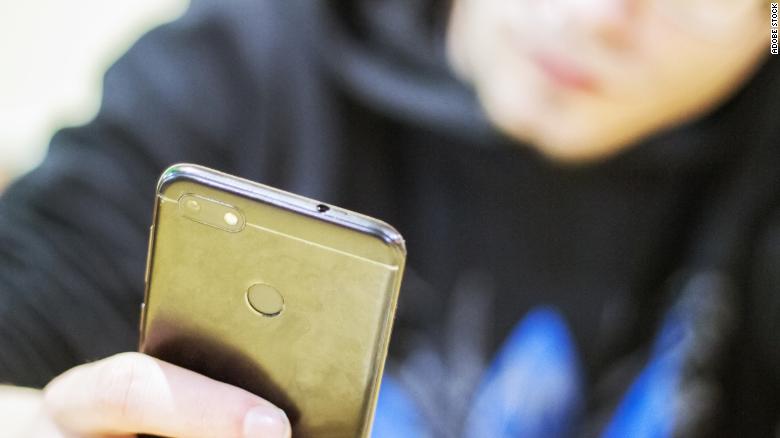Two young people say that Instagram put their lives at risk 4:58
Editor's Note:
Dr. Neha Chaudhary, a child and adolescent psychiatrist, is the medical director of BeMe Health and a professor at Massachusetts General Hospital and Harvard Medical School.
(CNN) -
The holiday season is just around the corner, and for many that means spending more time with the family, with members of all their generations.
Before you demand that your kids put down their smartphone for a meaningful chat about gratitude at the Thanksgiving dinner table, take a moment to consider what you're asking for.
When it comes to generational divisions, it's hard to find one greater than the use of technology, especially social media.
How to talk to teens about technology use (and its reduction) is one of the most common questions I get from parents at my child and adolescent psychiatry clinic.
Adults worry that excessive use of technology is affecting the mental health of their children.
For teenagers, it is more complicated.
Be it social media, games, or online chat forums, the digital world has become fundamentally integrated into your everyday life.
TikTok launches mental health resources for its users as Instagram faces criticism
Faced with this conflict, I often ask parents and caregivers not only how much their children use technology, but how they use it and how that use is affecting their mental state.
Once we know the answers to those questions, we collaborate to find solutions.
Rather than trying to fight usage and getting into a tug of war, families can focus before the holidays on how they use social media.
Knowing that the use of social media has a negative impact on mental health, families can together switch to a social media strategy that supports the social and emotional health of adolescents.
advertising
It is important that parents and caregivers take some time to reflect carefully in collaboration with adolescents.
(Parents, don't try to do this alone.) Here's my four-step strategy to help navigate this new space together and make healthy, productive changes:
Step 1: Help Teens Evaluate Their Use of Social Media
Talk about the quality of the content that your children consume on the Internet.
Is content generally positive, such as inspirational quotes or photos of pretty babies?
Or is it generally negative content, like politically charged news or memes that make fun of certain groups?
Not all content is the same, and if you do not deliberately and critically evaluate which category the content falls into, it is more difficult to know which one to consume more or less.
Your teens' usage pattern is equally important.
Are they usually on social media when they feel happy, depressed, bored, or angry?
Do they surf social media to distract themselves from uncomfortable feelings or to avoid doing the homework that accumulates?
What happens when they are away from their device?
How to know if you have a "cell phone addiction" and 12 ways to deal with it
If you ask teens to reflect on the relationship between real life and the moment they pick up their phone to open Instagram or TikTok, you could identify an underlying problem that needs more attention, such as anxiety.
Or you could help them identify better ways to deal with uncomfortable feelings, such as calling a friend or listening to music.
Step 2: Ask how the use of social media is serving them
Now is the time to ask your teens to be honest with you about the impact of social media on their mental health.
Ask them how they feel after browsing social media.
Do you notice a difference in how you feel when you view one type of content, such as puppy videos or body positive posts, versus another, such as highly edited and unrealistic photos of influencers or content of someone with a negative mood?
Teens often admit that the idea of separating from social media creates great anxiety at first.
But when they separate from their device, they end up feeling better.
It's not that surprising, as stepping away from social media can help you be present in the moment in a way that is helpful to your mood and overall mental health.
Australia plans to make parental consent mandatory for minors to use social media
The more links adolescents can make for themselves between their use of social media and the way that pattern of use serves them or makes them feel, the more likely they are to want to make changes for themselves, if it is in their own terms.
Step 3: Encourage teens to identify the changes they want
Ask them if they want to change their use of social media right now, and if so, how.
They may have identified that they want to spend less time on social media.
Perhaps they have realized that they feel bad about themselves after comparing their lives with those of others, and wish that the content makes them feel better about themselves rather than worse.
Whatever the changes, now is a good time to deliberately catalog them and set concrete goals.
It can be especially helpful to focus on what you would achieve with the changes.
Want to make up time for more off-grid activities?
Looking to improve your mood or self-esteem?
Looking for a more authentic connection and experiences?
It is essential that the adolescent set his own goals.
It is the way in which you will be involved in the process and will probably follow the changes.
Teens analyze how social media impacts them 2:41
Step 4: List and commit to the steps needed to get there
Now is the time to be concrete.
What has to happen for your children to achieve the goals they have set for themselves?
Do they need to pause the screen or restrict the use of the phone?
Do you need to put the phone in a basket during dinner, or leave it out of the room at bedtime?
Or maybe they are happy with the time they spend online, but want to focus on what they consume.
What accounts that make them feel bad do they need to unfollow or block, and what types of accounts will they seek to follow?
How will you approach spring cleaning your feed?
Will you substitute five negative accounts for five positive accounts a day, or do you have another method you would like to try?
Some teens have noted that turning off comments, making their accounts private, or keeping their use of social media within certain limits, such as certain times of the day, are helpful tricks to regain some peace of mind.
With a generation of digital natives sitting across the Thanksgiving table from generations who grew up solely playing outside with their next-door neighbors, it can seem like both parties come from different planets when it comes to topics like technology and social media.
Rather than trying to fight the teens' point of view, accepting that technology is part of their way of life and focusing on quality over quantity will allow for more productive conversations.
That is the space in which real and healthy change can occur.
TeensTechnology













/cloudfront-eu-central-1.images.arcpublishing.com/prisa/KMEYMJKESBAZBE4MRBAM4TGHIQ.jpg)

